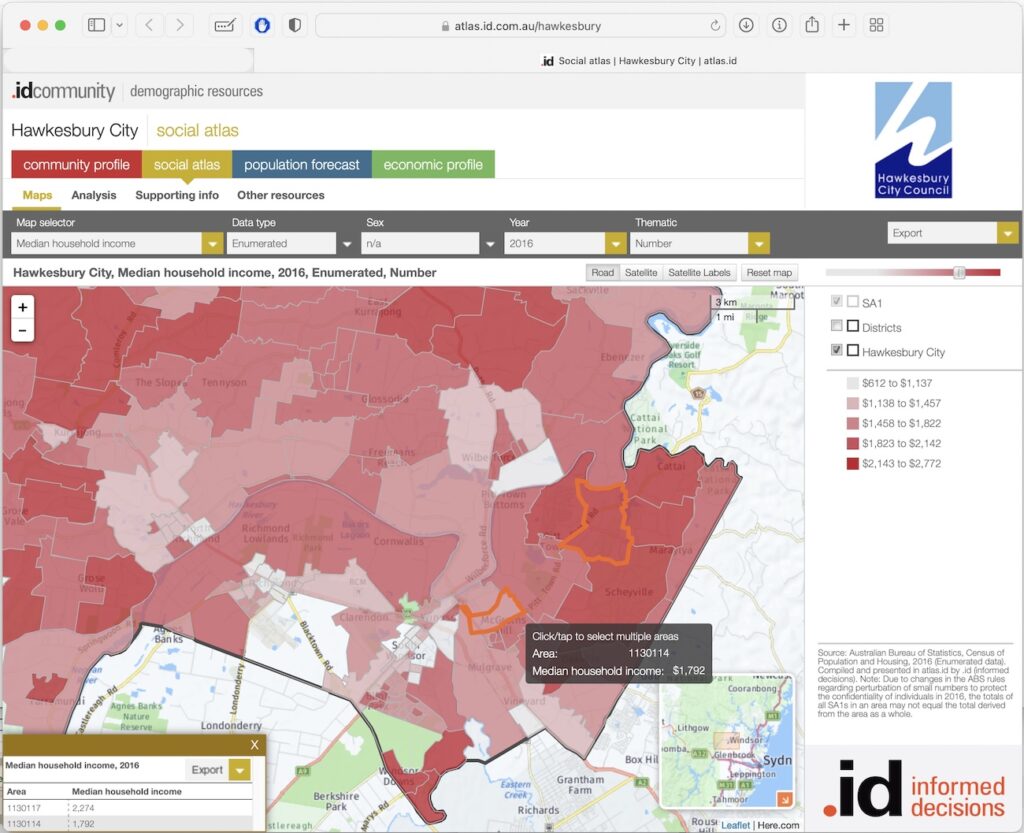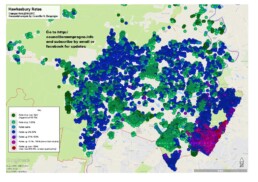Rates
Are you paying too much in Council rates? News from the 2022-2023 Hawkesbury Council Budget
Hawkesbury Council's rating system is broken and unfair. However, there are developments I'd like to share with you.
For context, I've been advocating for reform of our rating system since I was first elected to Council in 2016:
- October 2020 - Defeated in the effort to ensure fairer Hawkesbury Council Rates
- May 2020 - New land valuations give little relief for rates in most Hawkesbury suburbs
- September 2017 - Hawkesbury landowners get extended deadline for review of their land value
- August 2017 - Hawkesbury Council rate rises and the Valuer General
- August 2017 - Are some Hawkesbury residents paying too much tax?
There are many causes for the problem, ranging from distortions in land value caused by our proximity to nearby development, but two key changes introduced by the previous Council had a huge impact.
The last Council, under Mayor Lyons-Buckett and continuing under Mayor Calvert, introduced a 'Special Rate Variation' that drove everyone's rates up by a third, when the relevant rate-cap was (mostly) tracking inflation. It bears remembering that three of the Councillors who voted for that rate-hike were not returned when they stood for re-election in December.
That Council also changed the rating formula that varies the mix between a flat-fee (called a 'base rate') and your land value, moving the base rate from 50% to 30%. This has made distortions between land value and household income more acute. I'm pleased to report I voted against every such rate-hike in the last chamber.
Emphasising land value is a recipe for volatility (since it's the Valuer General who sets land value, not Council) and unfairness when land value becomes unrepresentative of a suburb in a way I'll explain below.

In calculating your rates, Council should be mindful of the principles in the Council Rating and Revenue Raising Manual, a document put out by the NSW Government through the Office of Local Government. Particularly, the principle articulated by the economist Edwin Cannan a century ago:

But the same document warns Councils that placing too much emphasis on land value in calculating rates is 'at best only an approximation' for:
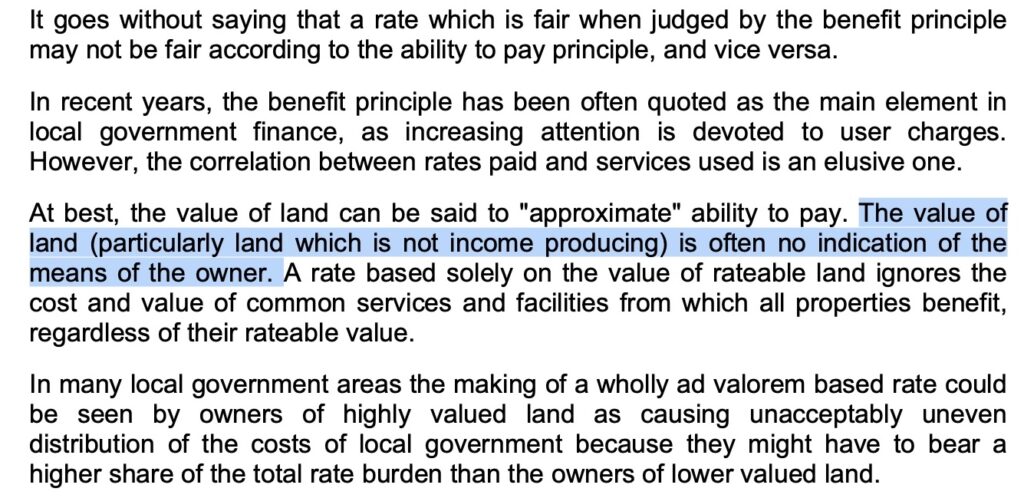
The new Council elected in December 2021 resolved in January to model changing the 'Base Rate' back to 50%. That's a move that I support. Those figures will be on public exhibition soon and the budget will be adopted to take effect July 1.
The common criticism is that people on acreage properties are rich and can easily afford higher residential rates, but the data reveals a different story.
The Hawkesbury Social Atlas displays a range of statistics about our area, including median weekly income broken down by suburb:
One analysis could be to compare median household income to median rates within the same suburbs to get a sense of fairness.

Weekly income and annual rates are figures with roughly the same magnitude (say $1000-$3000). It's not as though a ratio of one is a magic number – it's arbitrary, but it does allow for a comparison that factors in both rates and the 'ability to pay' principle.
Caveats: Such an analysis is just a guide – comparing the median-this to the median-that doesn't account for those that lay on the outer edges of those bell-curves. I know pensioners on below-median income sitting on land that just happens to be close to development that they loath and want no part of. Go and talk to them about what it's like to be taxed off the farmland that they and their parents grew up on.
Nor does this analysis touch on the other factor mentioned earlier – the relative access to services. Many residents of outlying suburbs live on dirt roads, and are far from the centralised services they are subsidising with their rates, while enduring other disadvantages. Setting rates with blunt tools isn't a science, as much as I wished were otherwise.
But this at least attempts to address the equity issue that is frequently raised by my colleagues in the chamber when they speak openly of 'rich acreage landowners' vs 'poor suburbanites' in built-up suburbs.
Here is what that comparison looks like for some suburbs under the current base rate of 30%:
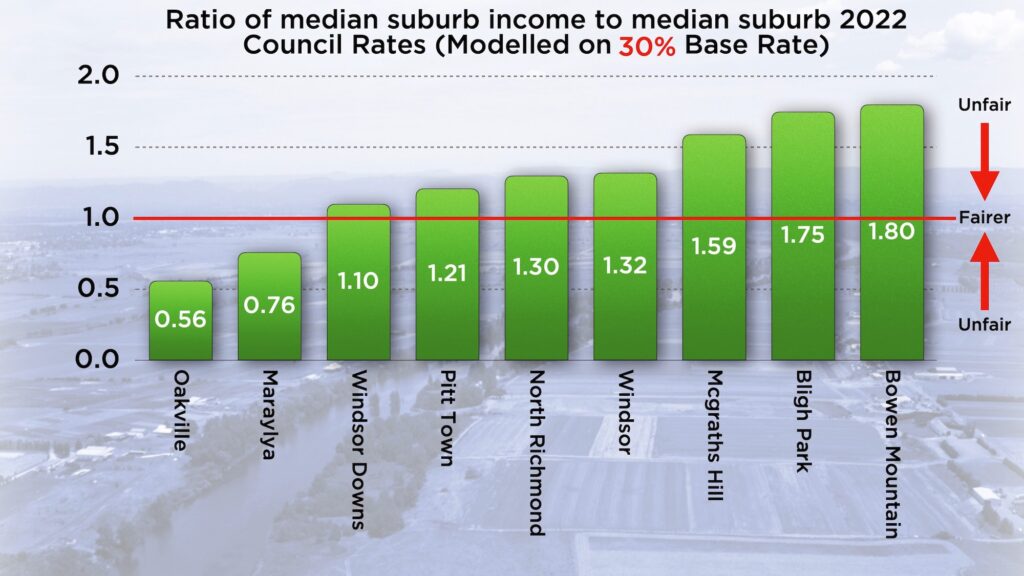
Here's what that means: Suburbs above a ratio of one are relatively advantaged, meaning that the rates they are charged are low compared to median household income in that suburb. Suburbs below the ratio of one are disadvantaged, meaning that rates are relatively expensive compared to income. In a fair system, one measure of fairness would be our ability to drive rates in suburbs towards the same ratio.
Now, here's what those ratios would look like for the same suburbs under a base rate of 50%:

Those suburbs who are paying not just double the average rates, but double even after factoring in relative income, move towards fairness. And other suburbs move in a modest way towards paying their fair share, and again, even after accounting for income.
If you want the raw figures, without adjustment for income, here is the preliminary modelling on a per-suburb basis for 2022-2023 rates in a range of Hawkesbury suburbs with a range of base-rates. These aren't final but will probably reflect figures which will be put on exhibition soon. Again, the base rate is 30% at the moment, and I'm advocating for it to move back to 50%.
A change to a 50% base rate is not a complete fix. It's cold comfort for residents in Oakville and Maraylya, enduring increased traffic from development and potholed roads being told that instead of paying well more than twice the rates as elsewhere, they'll now be paying only slightly more than twice even accounting for income.
Worse, the pensioner rebate on rates has been stuck at $250 for years and no longer keeps pace with our desire to give older people a hand, and Council has not addressed this in this year's budget. But any move towards fairness is a positive step.
Could we do more? Council can't set the base rate above 50% as that's limited by legislation. IPART released a long-delayed report into Council rating structures
Hawkesbury Council predicts it will take in $44M of rating income over 2022-2023 from 24,615 residences, 625 farms and 1617 businesses.
In 2016-17 that figure was $30.5M over 23,370 residences, 582 farms and 1509 businesses. In other words, Council revenue from rates have risen by 44% when the cumulative inflation rate over the same period was 11.6%
I’d say most Hawkesbury residents are prepared to pay rates that contribute to the common good, but their sense of a fair go is offended when they consider that some suburbs are paying two or three times the amount of rates of other suburbs with comparable income and access to services.
I'll continue to advocate for a fairer go while ever I remain on Council. If you don't already follow me on Facebook, Instagram or YouTube, please consider doing so for updates.
Defeated in the effort to ensure fairer Hawkesbury Council Rates
Last night the Mayor moved a Mayoral Minute to try to make our rating system fairer. We failed. The vote was defeated 8:4.
Some suburbs in the Hawkesbury are suffering under Council rates that are anywhere between 50% higher to 300% higher or more than other suburbs.
This is despite those families having similar incomes and similar access to Council services.
The point I made was that the guidelines laid down for fairness in rates requires us to be mindful of both the 'Benefit Principle' and the 'Ability to Pay' principle. Rates should be proportionate to both.
Unfortunately, our area is suffering from a good deal of land speculation caused by our adjacency to the North West Growth Sector, something I've written about and made videos many times before.
Let me encourage you to listen to the Mayor Patrick Conolly and myself as we make our case. My remarks are from 2:20 in.
Hawkesbury Council gets 2018 underway with a bang
After the unqualified success of Hawkesbury's Australia Day celebrations down by the river, the first Hawkesbury Council meeting of 2018 occurred on Tuesday night and went from 6:30pm and until well after 1am. A number of issues of consequence to local residents were on the agenda.
Thankfully, now that Council is "podcasting" its meetings (a move I pushed for and endorsed), I can bring you the audio of my contributions as part of my summary in an effort to remain accountable to you.
The Special Rate Variation
Firstly, a Mayoral Minute on the question of the >30% rate-hike our Labor-Greens dominated Council is applying for, was debated. I took exception to a proposal to use ratepayer's money for Council to seek to mail out a political "fact sheet" on the SRV when some of those facts are in dispute. I pointed out that the depth of feeling in suburbs like Oakville arise because, when you do an analysis of rates paid suburb by suburb (something I distilled from the raw data provided by Council staff -- a spreadsheet with over 24,000 rows in it), it reveals that some suburbs are carrying as much as 271% of the rating burden compared to other suburbs. The analysis is based on the total rates collected divided into the number of residences in each suburb. The system implemented by the previous Liberal Council in 2013 was far fairer than the system now in place. If the Liberals are re-elected to govern in 2020, I and my Liberal colleagues commit ourselves to fixing this problem.
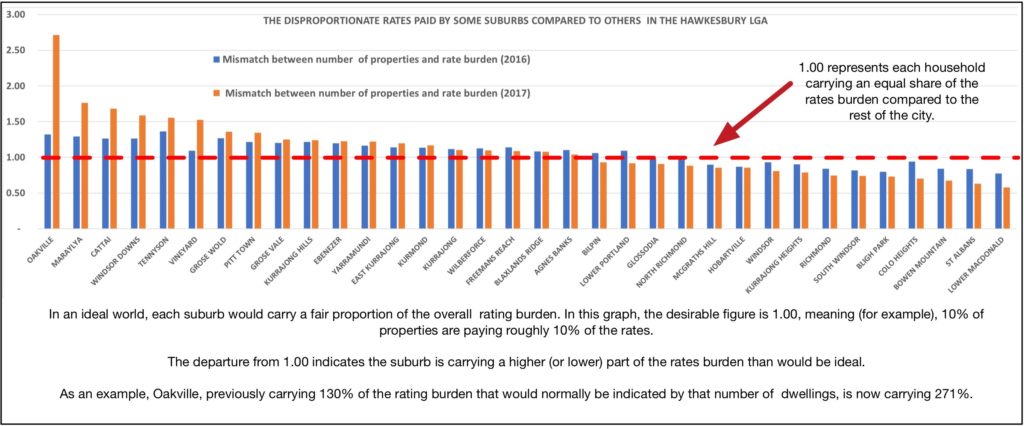
Those of you who wish to see the spreadsheet containing this analysis can click Suburb Analysis of Hawkesbury Rates 2016-2018.
My remarks to the Chamber are here, followed by those of my Liberal colleagues (@ 13m24s, if the link starts the audio at the beginning rather than at the right time-index):
 |
https://soundcloud.com/user-423594224/5-item-003-mm3-special-rate#t=13:24 |
I will shortly have more to say about rates in a future post.
A new child-care centre in Oakville
Last August, Council received a development application for the construction of a new child-care centre in Smith Road at Oakville. Although generally welcoming of the provision of services like this to the Hawkesbury, I called for the application to be deferred due to a lack of parking, the proximity of the building to a neighbour's fence, and the issues related to outdoor play, noise, and traffic control on the street outside.
In this case, the deferral allowed the applicant, Council planning staff and concerned near neighbours to come together and address those concerns. The revised application represented a real improvement; the development is now more centrally located on the applicant's land, and I was happy to move the recommendation to approve the development.
Here are my remarks (@15m24s):
 |
https://soundcloud.com/user-423594224/6-item-005-da0107-17-child-1#t=15:24 |
More haggling over Windsor Bridge
People frequently ask me about my opinions on the current project, now well advanced, to replace Windsor bridge with a new structure. And my answer is "It's complicated".
My mixed feelings arise from an awareness that the last bridge was built in 1874, If we only make this kind of decision every 144 years, then we have a solemn obligation to future generations to get it right. It disappoints me that we are spending close to $100 million on a project that condemns another century of heavy traffic to travel through a historic square. It is significant that both the Labor and Liberal tickets to the last Council election supported an additional crossing of the river (whether that is termed a "bypass" or not is immaterial) as a major infrastructure priority.
So: I hope that this bridge will be built soon... and elsewhere.
However, as a local government Councillor, I have to recognise that this is a State government matter. I wish that the State government would re-think its current plan in favour of new bridge at a different location that will be regarded as more visionary by our descendants, but I also recognise that local residents should not wait another decade or more for an alternative that isn't planned or budgeted for, and for which there is presently no political will. If you're stuck in the endless Windsor traffic bottleneck morning or evening, my sympathies are with you. There has already been too much delay.
I neither completely buy into the histrionic rhetoric of CAWB when they say that the plan represents the "rape" of Thompson square, nor the agitprop of the RMS, whose estimations of the improvement to traffic flow are at best suspect. A new bridge in this location will make some improvement to traffic, but in terms of cost-benefit, it's a very poor substitute for a bypass, which could cost only a little more.
However, the only solution that has money on the table now, that has planning well advanced, and which stands any chance of being concluded within this decade, is the present one. No other funded plan exists, even on a napkin. I think this is a point the detractors of the project ignore. How much longer would the community have to wait if the whole process had to be started over? And that is why, with these misgivings, I have consistently supported the construction of the new Windsor bridge whenever the matter has come before us.
So where does that leave Hawkesbury Council? We are not the consent authority for the bridge. Our opinion is, in the scheme of things, not as important as some of my colleagues' egos think it should be. Our responsibility is for the built environment that will be ours to manage after the construction finishes. This includes having a constructive role in consulting over the fabric and layout of the public spaces; the lighting, footpaths, street furniture, heritage interpretation, plantings, signage, public access and amenity, and so on. It disappoints me that some of my colleagues, having sought election precisely to be immersed in this issue, have instead fouled the efforts that have been made to permit the best outcome to be achieved. They repeatedly stick their fingers in their ears and think that saying "No" to everything will make the problem go away. It won't.
The case in point last Tuesday was the RMS plan to retain the first span of the old bridge as a viewing platform after the new bridge is built, to act as a historical interpretive landmark. Regardless of your opinion of the overall project, if there has to be a new bridge, this is unarguably a way of enhancing the Thompson Square precinct. It's a great idea. And because this will ultimately become Council's responsibility, the RMS sought our concurrence for the plan. And what did the Councillors elected on the "Windsor Bridge protest platform " do? Quibble, obstruct and dissemble. The annual maintenance cost for the static structure will be ~$5000p.a, and there is plenty of precedent for the RMS to pick up the tab for this -- small change on a $100M project. And yet every single vote on a necessary and practical aspect of the project that requires a clear indication of intent from Council to allow planning to proceed is instead diverted into a sterile debate on the whole bridge project. It's becoming tiresome.
Newsflash: The RMS knows what Council thinks. It doesn't need to repeat itself every five minutes.
My remarks to the chamber on this are here (@7 minutes in)
 |
https://soundcloud.com/user-423594224/7-item-008-windsor-bridge#t=7:00 |
Unapproved Dwellings in the Hawkesbury
Here's a common story: Someone lives in a tiny fibro house on acreage in the Hawkesbury. At some point during the 1970s or 80s, they do as many did and build a bigger brick house on the same block, and move in. They go through the old fibro house and meticulously disconnect the water and electricity, and a council inspector certifies it as uninhabitable. There is no obligation to demolish the old structure. The inspector leaves; the owner carefully reconnects the utilities, and the kids (or a parent, or someone else) moves in. No one cares. Decades pass.
This story is common enough that I could drive you past half a dozen such "illegal" dwellings in Oakville alone. Because I have long been a supporter of detached-dual-occupancy, I've always been kind of pleased that this is one rule that Council turned a blind eye to. I've never spoken to the neighbour of such a property that was put out by such an arrangement; easy to understand when you're on enough land that your neighbours living arrangements don't disturb you. I'd be happy for this to continue.
But here's another story: Someone allows a friend in need to take up residence in a boat shed down by our river with a maximum flood risk. They aren't on anyone's census or the radar of emergency services, and then a natural disaster strikes. How many people need evacuating? From where? Manifestly, it will always be unwise to permit anyone to live in such a place, and if Council knew about it, it would have to discharge its duty of care to act.
How we deal with these two ends of the same demographic phenomenon is vexed, and I supported a call for a report to be brought to Council.
My remarks to the chamber are here (@2m50s):
 |
https://soundcloud.com/user-423594224/13-item-019-nm4-unapproved#t=2:50 |
Hawkesbury landowners get extended deadline for review of their land value
"In this episode, a climactic meeting with the Valuer General, plans to secede from the Hawkesbury, and a ray of hope for people who have endured massive rate rises, but only if you act now.
In my last video I described how thousands of Hawkesbury ratepayers have been hit with a big rise in their Council rates. I described how the 23% of our landowners whose rates have gone up, are now paying 35% of Council rates, and how that just isn’t fair.
I explained how the biggest part of that rise came from changes to land value as calculated by the Valuer General. An important development has occurred recently that you need to know about.
Hosted by Council, a representative from the Valuer General’s office came to a very well attended meeting at the Windsor Function Centre on August 30th.
Present were hundreds of angry ratepayers, stung by the rise in their rates, and who generally had not availed themselves of the opportunity to apply for a review of their excessive land valuation before the 60 day cutoff – the period that began after everyone received their valuations earlier this year.
At that meeting, the Valuer General made two concessions. The first is that Hawkesbury Residents have now had the deadline extended, and they can apply for a review of their land valuations until the end of September 2017.
If you live in the Hawkesbury and your rates have gone up, I strongly suggest that you apply to ask for a review of your land valuation.
The details of how to do that are at the link on the Valuer General’s website. My hope is that if enough people do this, some pressure can be brought to bear.
The second concession was that no landowner asking for a review in this round will have their land valuation put up. This is important because when you ask for a review, it could go down or up, and this makes the process of asking for a review a no-risk proposition.
However, unless you cite the right reasons, your application for a review may fail.
“I don’t like this” or “I’m on fixed income and can’t afford to pay” aren’t likely to get much traction, even if they’re true.
As I see it, there are three grounds for review, especially if you live in the Oakville, Maraylya, or Vineyard area.
The first is that real-estate values are being distorted by adjacent development caused by the North West Growth Sector.
Of course, one riposte may be that, even so, they are current the real-estate sales values, and that the Valuer General’s is merely applying their formula, and that’s that.
However, residents attending the meeting at Windsor were alarmed to find that only around ten sales in the area were used to define the values for the whole suburb, which is over 1200 properties in Oakville, Maraylya and Vineyard. This sample space is too small to be representative. Similar properties are grouped together into statistical units called Components. Nearby components separate to the Oakville component are cheaper, despite both containing acreage properties with similar aspects and uses. In my opinion, the Valuer General’s methodology is flawed.
My second concern is that land value should be reflective of what people can do with it. This instructive video from the Valuer General acknowledges that things like whether the land is sloped, or has an ocean view, has good soil, or is subdividable, all affect land value. Overwhelmingly, your land that has risen in value so sharply can only be put to the same use that it could be put a year ago, and no subdivision is in prospect. The Valuation of Land Act states that land must be valued according to its “highest and best permitted use”. But what happens when land is bought, at inflated prices, on the basis of speculation that it will be rezoned in the future for a different purpose?
The Valuer General should be prudent enough to mitigate against the effects of speculation in the market.
The third concern is that the Valuer General should acknowledge that changes as severe and rapid as this are socially and politically intolerable.
When you think about it, there is some precedent here. Look at what happened with the recent Fire and Emergency Services Levy.

You will recall this was introduced with great fanfare by the State Government in December 2015, only to be withdrawn in July this year, precisely because the government’s modelling was flawed. When it came out that the change in tax to many property-owners, based on land valuations from the Valuer General, were too steep, too unfair and too rapid, the whole program was put on hold.
Political intervention was justified there, and is here too, and for exactly the same reasons.
Your Liberal Councillors, including myself, have stood up for Hawkesbury residents on two fronts. To the degree that Council can affect change, we will continue to push for it, all the while continuing to bring these concerns before our State colleagues as well.
I’ll end by answering a remark I’ve heard at more than one community meeting. Ill-feeling is bad enough among some to suggest that parts of the Hawkesbury feeling this financial pain should secede from the Hawkesbury and apply to join the Hills Shire, or that the whole question of amalgamation between the Hawkesbury and the Hills be re-opened.
I’m not sure what you’d call that. Following the model of Brexit, should it be Hawkes-xit? Oaks-xit?
Frankly this is a nutty idea. Firstly, Hills Shire council never saw a development they didn’t like, and if you want the whole of the Hawkesbury to look like Rouse hill or Kellyville, then… please see your GP to change your medication.
Secondly, you would be no better off. The Hill’s rating structure is not so different to our own. To join the Hills Shire, where people may or may not eat their babies, would be at best a Faustian bargain that we would regret.
The Hawkesbury is a special place, and it deserves to stand on its own and determine its own destiny. I regard our corner of the world as a bulwark against the encroachment of what I call ant-hill Sydney. It is a valuable region of the greater Sydney area that is still most valuable for its amenity, open space, agriculture and heritage. If people can’t afford to live on acreage allotments because the rating structure is unfair, those on Council who have engineered this change might care to accept some of the blame when landowner’s thoughts turn to selling up to developers.
Video blog - Hawkesbury Council rate rises and the Valuer General
Further to an earlier post on Hawkesbury Council's rates rises, I've done some further analysis on the factors contributing to sharp rate rises for many Hawkesbury ratepayers, especially those in Oakville, Maraylya and Vineyard.
The maps referenced in the above video can also be downloaded here.

Remember, subscribe, like and share for updates!
Are some Hawkesbury residents paying too much tax?

The hot-button issue this month is that rate notices arriving in the letterboxes of many Hawkesbury ratepayers show that their rates have risen sharply, while other suburbs have had a modest decrease. And by "risen sharply", I mean doubled or tripled from this time last year. The worst example I found was a property at Pitt Town now paying over six times the rate of an average property compared to last year.
Most residents accept that paying tax (in this case, Council rates) is necessary to provide the services people expect. However, many community consultation meetings (and last Tuesday's Council meeting) were full of ratepayers who are visibly angry at what they feel is a betrayal of the principle everyone pitching in equally; the Aussie notion of a "fair go".
So are some people now bearing a disproportionate burden of Council rates? I and my fellow Liberal Councillors think some are, and we've tried to do something about it.
What's happened is a triple-whammy of changes and proposed changes, and it's been challenging to educate the public about the contribution of each part.
Here's how to understand what's happened.
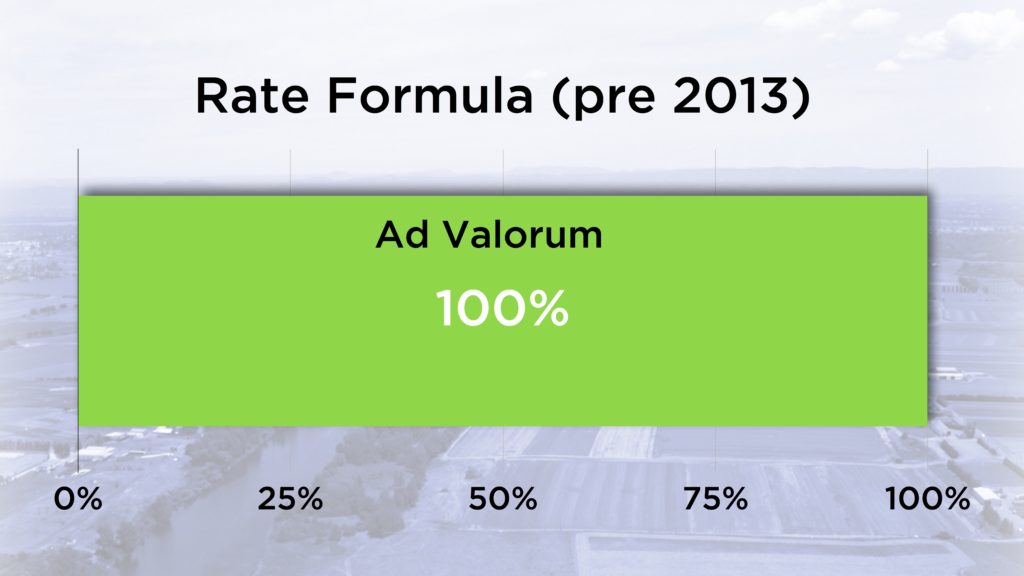
Prior to 2013, your Council rates were calculated entirely on your land value. This is called the "Ad Valorum" approach (Latin for "according to the value"). This of course meant that if your land value rose sharply, your rates reflected that rise very directly.
The Liberal-lead Council instituted a change in 2013 that introduced what's called a "Base Rate" of 50%, meaning that there was a standard charge paid by everyone, and that the remainder of rates Council collected based on land value was also 50%.

The Liberal Council regarded that as a reasonable and democratic change to make, and it resulted in an "evening out" of rates paid by both residential and rural-residential landowners. Rural-residential properties frequently are situated further from common resources in the towns, and endure worse roads, a lack of kerb and guttering, poorer street-lighting, and other disadvantages. Of course, the 2013 change resulted in some rates rising and some falling, but the changes were calculated to be moderate, and not extreme, unlike the most recent changes.
In September 2016, a majority of the Councillors elected to Hawkesbury Council were Independents, Labor and Green. The four Liberal Councillors are now outvoted by the 8 Councillors in this decidedly left-wing alliance.
This year, the new Council decided to change the formula again and reduce the base rate to 30%, and consideration is being given to a Special Rate Variation (SRV) that will put everyone's rates up by more-than-rate-pegging if the proposals currently before us are endorsed by the Council and then by IPART.
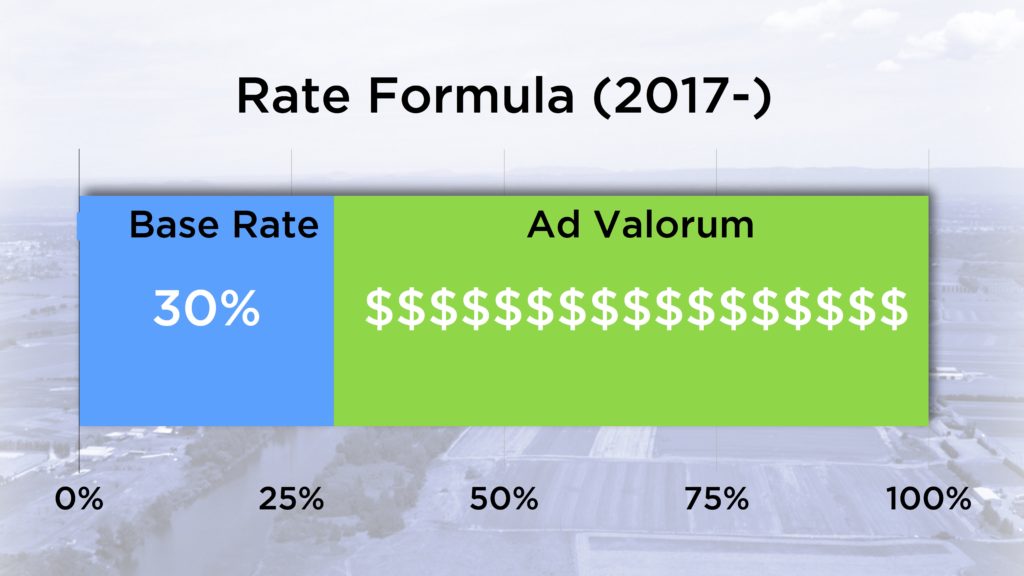
Your Liberal Councillors voted against this change. The reduction of the Base Rate to only 30% means that people experiencing a spike in land value are more heavily hit.
It is not the purpose of this article to argue the case for or against the SRV, as that is more complicated.
Enter, the Valuer General. Land values in a range of suburbs across the district have changed sharply in the most recent round of valuations (which generally occur once every four years).
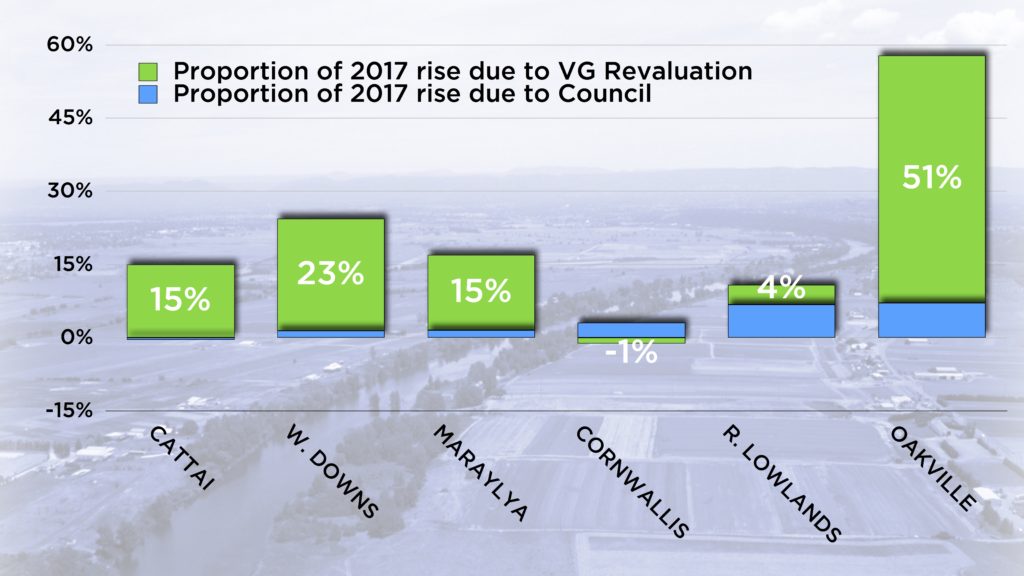
The area in which I live, in Oakville, has been particularly hard hit, with the average rate rise of 57%, and with some property owners very much harder hit than that.
Frankly, the Valuer General has erred in valuing the land in Oakville in the way that it has. It has erred because land value should reflect the prospective "subdividability" (if I might coin a word) of land, and of course there is no prospect of landowners in Oakville being able to subdivide their land at all in the near future. The land valuations are calculated on recent real-estate sales figures, and this isn't the same thing. Very heavy development is occurring on the other side of Boundary Road in the Hills LGA, and this has artificially skewed the figures in a highly disadvantageous way to Hawkesbury residents whose income has not risen magically to keep pace with their land value. I am heartened to hear that the Valuer General will be visiting the Hawkesbury to meet with residents and my hope is that they will be willing to revisit their valuation processes instead of simply coming with the attitude of only explaining but not changing their conclusions.
At the Council meeting on Tuesday 8th August, the gallery was packed with residents supporting a Liberal resolution to re-visit the rating formula and to apply pressure to the Valuer General to explain their decision. This motion was opposed by Mayor Lyons-Buckett and the independent-Labor-Green alliance and substituted with a significantly watered down motion that effectively called for no action to be taken on the base rate.
This was disappointing, and rural-residential landowners badly affected by both the change in formula and the Valuer General's decision will continue to be hardest hit.
I and your Liberal Council representatives will continue to listen and represent your concerns, right up to the next Council elections.
-Councillor Zamprogno.

